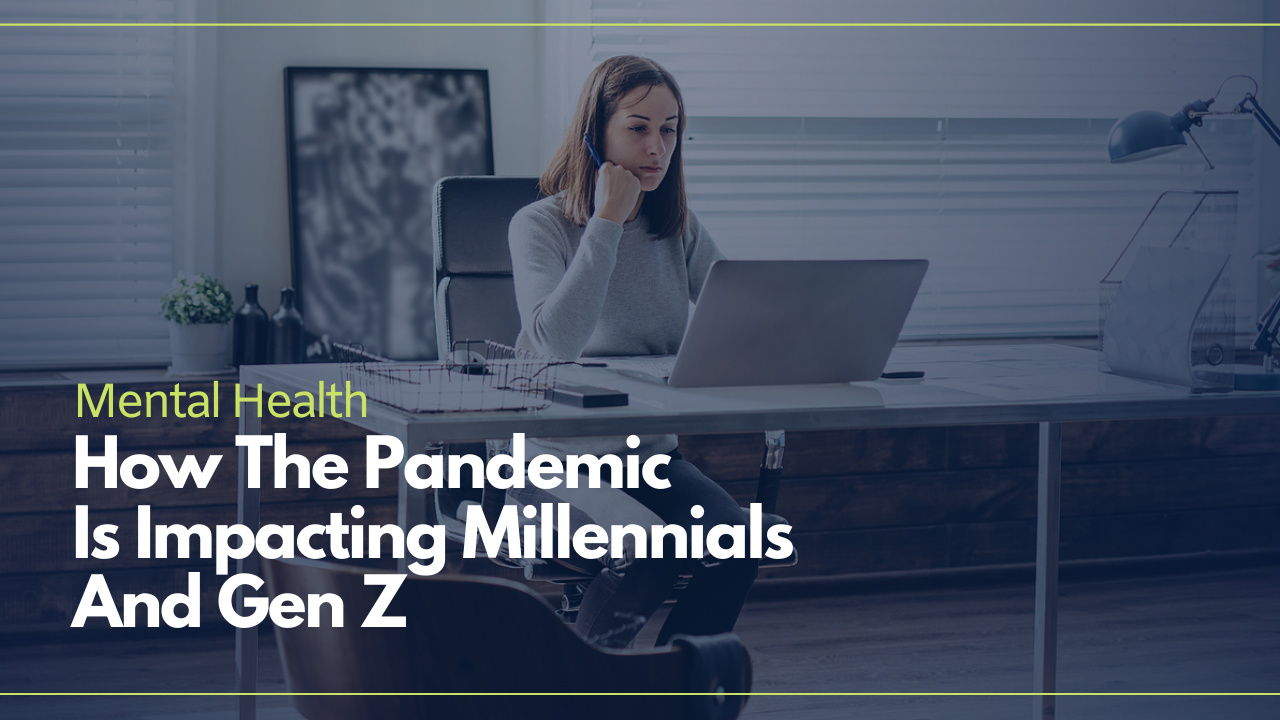- The pandemic is having an impact on the behavioral health of all workers, particularly younger generations.
- Research conducted by The Standard and Versta Research found that Gen Z and Millennials may be particularly under pressure.
- Allwork.Space spoke with Melissa Oliver-Janiak, senior director of Benefits and HR Service Center at The Standard, to understand how the pandemic is impacting younger workers and how companies can respond to this crisis.
The COVID-19 pandemic has had an impact on behavioral health in the workplace. While workers of all ages are struggling, recent research has found that younger workers (Gen Z and Millennials) are affected by behavioral health issues at much higher rates than older generations.
Research conducted by The Standard and Versta Research concluded that younger workers are struggling more because the pandemic has compounded stressors that these generations were already struggling with, including:
- Less job security
- Less housing stability
- More debt
- Lower wage earnings than previous generations.

Allwork.Space spoke with Melissa Oliver-Janiak, senior director of Benefits and HR Service Center at The Standard, to understand how the pandemic is impacting younger workers and how companies can respond to this crisis.
Allwork.Space: Several recent surveys, including the one conducted by The Standard and Versta Research, have found that young workers are struggling the most with their mental health. Why?
Melissa Oliver-Janiak: The pandemic has been isolating for most people because we have been asked to reduce our social circles and refrain from most public and social activities. Younger workers are less likely to live in a family unit, and if you live alone or with a roommate, the pandemic may be even more isolating.
Younger workers are also, by definition, earlier in their careers. This traumatic event and the accompanying uncertainty regarding when it will end and the longer-term societal and financial impacts loom larger in their lives.
Younger workers have also grown up in a world where there is already less stigma around mental health concerns than there has been for prior generations, so perhaps they are more in tune with and willing to voice their own concerns.
Finally, our research found that younger workers – Millenials and Gen Z – are the least likely to be aware of the mental health benefits and support available to them from their employers. So, while potentially more aware of their own mental health needs, individuals in these groups may be less likely to take advantage of programs or resources provided by their employer that can provide support to them during this time.
Allwork.Space: Is this a new phenomenon or do you believe young workers were already struggling more than older workers prior to the pandemic?
The Standard’s Behavioral Health Impact Update with Versta Research found that a significantly lower percentage of young workers reported being mentally well, and reported higher use of alcohol and drugs, both prior to the pandemic and during the pandemic, than Gen Xers and Boomers.
In fact, the differences were already pretty stark, with 48% of Millennials surveyed in 2019 reporting being mentally well, compared with 65% of Gen Xers and 81% of Boomers.
So, this is not a new trend.
However, the pandemic has certainly widened this gap. In particular, our research found a decrease in younger workers identifying as mentally healthy during the pandemic (that 48% slid to 40%), and a corresponding increase in the percentage of younger workers reporting serious mental illness increased from 10% to 16%.
Allwork.Space: If they were struggling even before the pandemic and the pandemic has led to more pronounced mental health issues, how is this affecting the work or careers of young workers?
Younger workers are generally more likely to report impacts on their work due to their mental health, at double or even greater than the rates seen in Gen X and Boomers.
Millenials and Gen Z report being less productive at their job, having to miss a day of work, taking temporary leaves, and even having to quit or being fired from a job due to their mental health. It is not hard to imagine the longer-term impacts of lowered productivity or having to step away from a role altogether.
Allwork.Space: Can you share some of the long-term consequences that companies and workers might experience if mental health issues are not addressed?
We are talking about the next generation of leaders in our workforce, so the potential consequences are huge. We don’t want a future CEO or innovator to lose their footing and momentum because they did not have the tools and resources to support their mental wellbeing.
It is vital that we destigmatize mental health struggles and provide programs that will enable employees of every generation to stay at work, bring their best, and continue striving.
Allwork.Space: Both companies and young workers stand to benefit if these issues are addressed. Are companies responding to this and if so, how?
The pandemic really highlighted the need for companies to act in order to support employees: people need time off to care for themselves or for a sick loved one, for children whose school buildings are closed or for elderly parents who need support.
People need financial help and education in ways they did not before due to the prolonged uncertainty. And people need tools to cope with the stress and strain of this pandemic that we’ve all been experiencing from the beginning.
In response, we’ve seen a lot more flexibility coming from employers in terms of where and when work gets completed for businesses in roles where that is possible, as well as added benefit programs that offer solutions for each of these areas.
With respect to mental health, the most important thing though, in my opinion, is for employers to publicly acknowledge the mental health impact of the pandemic on everyone. That reduces the stigma and opens the door for employees to express their needs. We, and many other employers, have personalized the discussion more by bringing trusted leaders from within to deliver those messages of acknowledgement and support. And this messaging will have to continue.
The next key thing is to make sure you have robust mental health support available, ideally in more than one place, and communicate that support so that employees know what those benefits are and how to access them.
For example, The Standard began last spring by reminding people of our telemedicine benefits which we made free (including counseling) for a period of time. We later added to our traditional EAP, another free enhanced mental health benefit available to all employees and most dependents. Throughout this time The Standard, as our disability benefits carrier, connects employees who need leave for mental health reasons with additional support to stay at work or return to work.
Recognizing that not everyone needs or will take advantage of counseling, we also added wellness days for employees – paid time off that can be taken without prior notice when an employee needs a break. About 50% of our employees have taken advantage of this benefit since it launched in the fall. This confirmed the need for this benefit, and it seems to be an effective way to help support mental wellness even for those who do not feel compelled to seek professional help.

 Dr. Gleb Tsipursky – The Office Whisperer
Dr. Gleb Tsipursky – The Office Whisperer Cat Johnson – Coworking Marketing Maven
Cat Johnson – Coworking Marketing Maven Angela Howard – Culture Expert
Angela Howard – Culture Expert Drew Jones – Design & Innovation
Drew Jones – Design & Innovation Andrea Pirrotti-Dranchak – Competitive Advantage
Andrea Pirrotti-Dranchak – Competitive Advantage Jonathan Price – CRE & Flex Expert
Jonathan Price – CRE & Flex Expert Jeremy Fennema – Tech Innovation Alchemist
Jeremy Fennema – Tech Innovation Alchemist







